
|
|

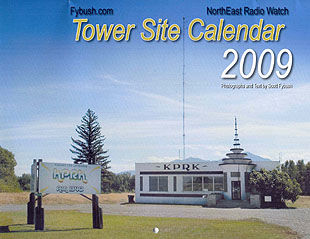 November 21 & 28, 2008
November 21 & 28, 2008
WGHP-TV, High Point, NC
So we're all done with our recap of Big Trip 2007 - and just a few weeks ago, a big pile of boxes of Tower Site Calendar 2009 came back from the printer, all ready for sale and for your office or transmitter shack wall. We hope you'll take a moment to get your order in for the calendar, or better yet, show your support for Site of the Week and NorthEast Radio Watch with a subscription!
This week, we continue a multiple-installment "Little Trip," recapping our travels as we made our way to Charlotte, North Carolina for last year's NAB Radio Show.
In this week's installment, we rectify another omission from our 2003 swing across North Carolina. That trip found us spending barely a day in the "Triad" - the sprawling market in the north central Piedmont region of the state that encompasses the big cities of Greensboro and Winston-Salem, the somewhat smaller city of High Point and a host of smaller cities such as Burlington, Graham, Thomasville, Kernersville and Lexington.
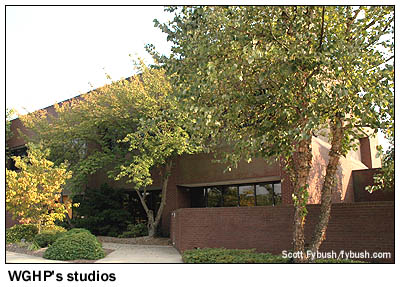
|
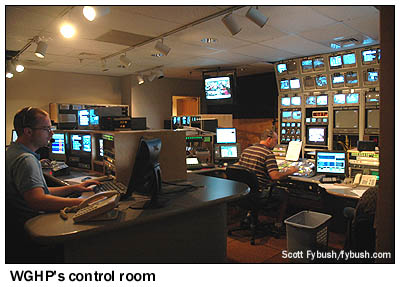
|
Along the way, we made a very brief photo stop off Business I-85 south of High Point at the studios of the market's Fox station, WGHP (Channel 8), then another quick stop ten miles or so down US 311 near Randleman, North Carolina, where WGHP's tower marked the southern end of a string of tall FM and TV towers serving the Triad cities.
And that, in all honesty, was about as much as we thought about WGHP until a year or two later, when an e-mail landed in our inbox from Charles Layno, the station's transmitter engineer.
 He told
us about some big changes on the way at the station - in particular,
a brand-new tower going up for DTV next to the existing tower
in Randleman - and invited us to drop by for a tour if we were
ever back in the region.
He told
us about some big changes on the way at the station - in particular,
a brand-new tower going up for DTV next to the existing tower
in Randleman - and invited us to drop by for a tour if we were
ever back in the region.
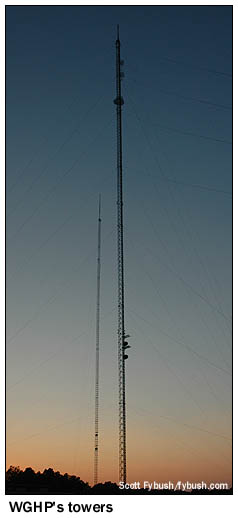 It
took another couple of years, but we finally made in September
2007, at the end of a long day that had started in Roanoke.
It
took another couple of years, but we finally made in September
2007, at the end of a long day that had started in Roanoke.
By the time we pulled in at the WGHP studios on Francis Street, a small frontage road on the south side of Business I-85, the 5 PM news was already on the air, so we got to see the station in full swing as Layno showed us around the building.
A bit of history here (with much more over at Layno's own Triad TV History website, for those who are interested): WGHP came to the market's airwaves a bit later than the other Triad VHF stations. In Greensboro, WFMY (Channel 2) had pioneered the medium, signing on in 1949 and becoming the CBS affiliate for a huge swatch of central North Carolina and southside Virginia. WSJS-TV (Channel 12) came on in 1953 from Winston-Salem, carrying NBC and some ABC programs. Many viewers in the Piedmont could also see ABC from Raleigh's WRAL-TV (Channel 5) to the east; indeed, the cities of the Carolinas are all so closely spaced that even now, many viewers with rooftop antennas can easily watch the neighboring Raleigh-Durham and Charlotte signals from the Triad.
Channel 8 was opened for applications in the early sixties, and amidst a number of competing applications for the channel in Greensboro and Winston-Salem, Southern Broadcasting's application to put a first TV service in High Point stood out. Southern was granted the construction permit, and in August 1963 it began erecting a 1255' tower in Randleman. Rayno reports that a crack in a support leg of the tower forced the tower to be dismantled when it hit the 900' mark, then rebuilt after the bottom section was replaced, delaying channel 8's debut by two months.
On October 15, 1963, the new station - christened WGHP for Winston-Salem, Greensboro and High Point and serving as the region's primary ABC affiliate - made its debut from "temporary" studios at the Sheraton Hotel in downtown High Point, a location it would call home for more than two decades.
In 1984, WGHP moved to its present home, a modern two-story brick building. All of the broadcast operations are on the first floor - the news studio just beyond the front door, a spacious newsroom off to the right, and a control room/engineering hub that was in the process of being upgraded when we visited, as the 1980s-era wiring and automation gave way to 21st-century digital technology.
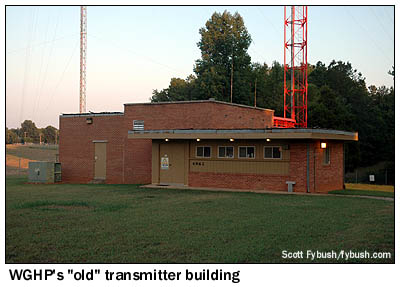
|
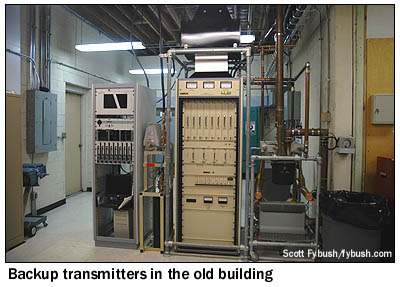
|
But the biggest changes were happening ten miles away in Randleman, where WGHP's transmitter campus provides a snapshot of all the changes that half a century have wrought in TV transmitter-site design and construction.
As the daylight wanes, we start our tour on Plainfield Road at the 1963 site, where a modest brick building sits at the base of the 1255' tower. Back in the day, of course, a building this size was all but filled by the analog channel 8 transmitter; in its final incarnation, a pair of Harris TVD50H transmitters shared the big transmitter room, with a small office area off to the side.
When WGHP built its new site a few hundred yards to the east in 2005-2006, the old site remained in place as a fully redundant auxiliary site. Our visit in 2007 found the original low-power WGHP-DT (Channel 35) transmitter, a 2002-vintage Thales, in place next to a low-power Larcan channel 8 auxiliary analog rig, looking rather lonely in what was otherwise a big empty space.
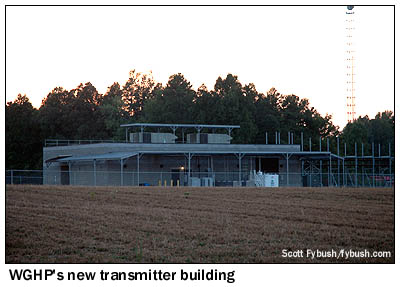
|
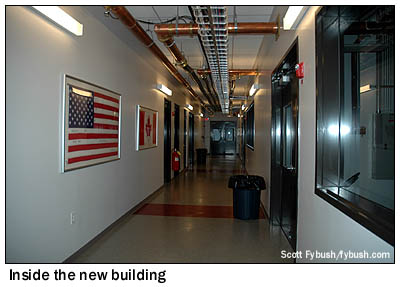
|
A two-minute drive back out to US 311 and over to Old Courthouse Road, the next side road to the east, brought us four decades into the future: the 2005-06 construction of WGHP's new site provided much more space for the station to move into the DTV era.
The new building contains more of everything: better power supplies, room for emergency switching so that the station could handle some rudimentary program origination if the studio were to become unusable, a spacious engineering office, and separate rooms for full-power analog and digital transmission.
(Those flags in the hallway? They honor the tower crew, some of them Canadian, who erected the new 1248' tower that went into service in March of 2006.)
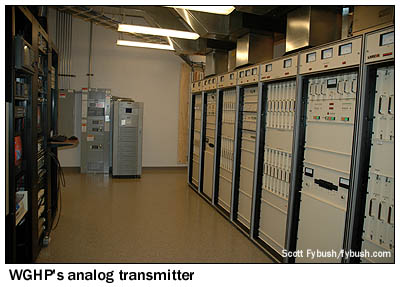
|
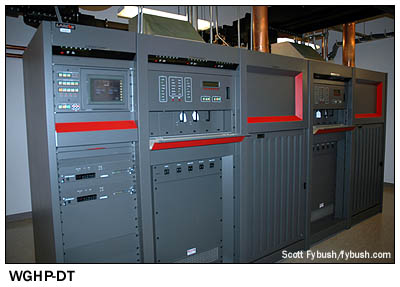
|
By the time this site went into operation, WGHP had come a long way from its old days as an ABC affiliate. After passing through a series of owners, including Taft and its successors Great American and Citicasters, the station ended up in the hands of New World Communications in 1994. New World, of course, quickly became involved in one of the biggest deals in the history of TV affiliation swaps, moving its dozen stations, most in medium and large markets, over to Fox - and in the process helping to turn the "Big 3" network system that had held for decades into the "Big 4." (Someday, if I ever have the free weekend I dream of, I'll finally put together a little website chronicling all those affiliation changes...)
WGHP flipped from ABC to Fox on September 9, 1995, sending ABC over to the former Fox affiliate, WNRW (now WXLV) on channel 45. A few months later, Fox bought the station outright from New World, giving the Triad its first - and so far, only - network O&O.
When we visited, WGHP was in the process of being sold again, as Fox spun off most of its smaller-market properties to Randy Michaels' Local TV group. The station was also making preparations for the big analog shutdown in early 2009, which will see WGHP give up its temporary channel 35 digital allotment, moving its digital signal back to channel 8.
The Larcan TTP44MH analog transmitter that went into service in 2006 will be easily adapted to digital: since it's essentially a big array of individual solid-state amplifier modules, it will be split in half, with one side continuing in analog at half power while the other side is converted to channel 8 digital use. After transition day, the analog half will be moved over to the 1963 building and converted to digital to serve as a full-power aux. Meanwhile, the channel 35 transmitter, one of the few Larcan UHF DTV transmitters we've seen in use, will be moved southwest to sister station WBRC in Birmingham, which will stay on UHF after the transition.
It's quite a long way from those early days in the mezzanine of the Sheraton Hotel - and well worth a stop on our way down to Charlotte, don't you think?
(One more note - in lieu of a Big Trip this year, we're coordinating this series of Tower Site of the Week presentations with weekly audio updates over at our sister site, Tophour.com, so be sure to head over there each Wednesday to hear the IDs we gathered as we made this trip last year, including a nearly-complete run of Triad radio.)
- Previous Site of the Week: WPAQ, Mount Airy, NC
- In Two Weeks: WBT, Charlotte, NC
- Site of the Week INDEX!
- How can you help support Site of the Week? Click here!
- Submit your suggestions for a future Site of the Week!
